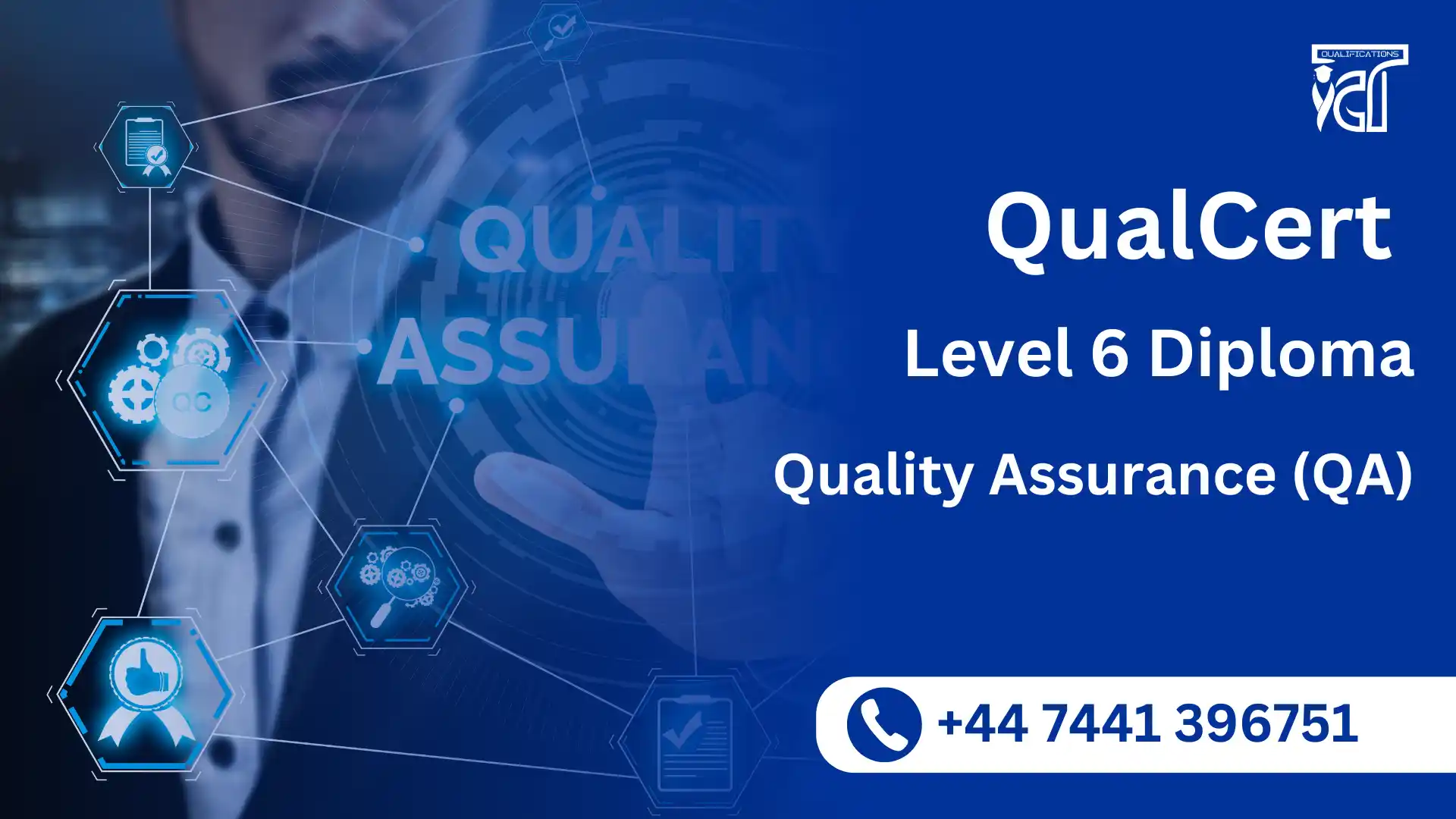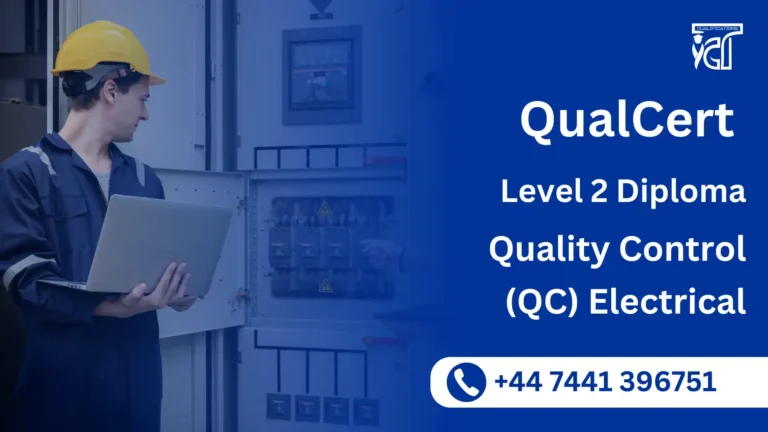The QualCert Level 6 Diploma in Quality Assurance (QA) is a comprehensive and industry-recognized qualification designed to equip learners with advanced knowledge and practical skills required for managing and implementing quality assurance systems across various sectors. This diploma bridges the gap between operational-level quality control and strategic-level quality management, making it ideal for professionals aiming to advance their careers in the field of quality.
In today’s competitive business environment, ensuring consistent quality, regulatory compliance, and continuous improvement is vital for organizational success. This course empowers learners to take an active role in planning, monitoring, and enhancing quality frameworks that align with international standards such as ISO 9001.
The program is suitable for professionals with some prior experience or education in quality-related fields who are ready to take on more responsibility within their organizations. Learners will gain expertise in areas such as quality planning, risk management, internal auditing, customer satisfaction, and performance measurement—equipping them to contribute to operational excellence and organizational growth.
Whether you’re seeking to climb the quality management ladder or move into consultancy and auditing roles, the QualCert Level 6 Diploma in Quality Assurance provides the tools, knowledge, and recognition needed to succeed in a wide range of quality-driven industries.
QualCert Level 6 Diploma in Quality Assurance (QA)
The QualCert Level 6 Diploma in Quality Assurance (QA) certification is designed to provide a structured and comprehensive framework for developing expertise in quality assurance. Below is the qualification structure, including the Total Qualification Time (TQT) 1200, Guided Learning Hours (GLH) 600, and 120 Credits associated with the program.
| Unit Ref# | Unit Title | Credit | GLH | TQT |
| QC07013 – 1 | Quality Management in Organizations | 20 | 100 | 200 |
| QC07013 – 2 | Continuous Improvement Techniques | 20 | 100 | 200 |
| QC07013 – 3 | Quality Audit Practices | 20 | 100 | 200 |
| QC07013 – 4 | Risk Management in QA | 20 | 100 | 200 |
| QC07013 – 5 | Supplier Quality Management | 20 | 100 | 200 |
| QC07013 – 6 | Regulatory and Legal Framework for QA | 20 | 100 | 200 |
GLH (Guided Learning Hours) and TQT (Total Qualification Time) are terms commonly used in vocational qualifications to help define the amount of time a learner is expected to spend on their studies.
1. GLH (Guided Learning Hours)
GLH refers to the number of hours a learner spends being directly taught, supervised, or supported during their course. This includes the time spent in activities such as:
- Classroom instruction
- Practical workshops
- One-on-one tutoring or mentoring sessions
- Online learning sessions with tutor support
In other words, GLH represents the time that learners are actively engaged with their instructors or learning activities.
2. TQT (Total Qualification Time)
TQT represents the total amount of time a learner is expected to invest in completing a qualification, including:
- GLH (Guided Learning Hours): Time spent on direct learning, as explained above.
- Self-Directed Learning: This includes time spent on independent study, research, assignment completion, preparation for exams, and any other work the learner does outside of direct teaching hours.
TQT is a broader measure that includes all the time required to achieve the qualification. It helps learners and employers understand the overall commitment required for the qualification.
Key Differences Between GLH and TQT:
- GLH focuses on direct learning with guidance or supervision.
- TQT includes GLH as well as independent study time and other learning-related activities.
Example:
If a qualification has a TQT of 600 hours and a GLH of 250 hours, it means the learner should spend 250 hours in direct learning (classroom, online, or tutor-led sessions) and 350 hours on independent study or research.
Learning Outcomes: QualCert Level 6 Diploma in Quality Assurance (QA)
1. Quality Management in Organizations
- Understand the principles and frameworks of quality management systems.
- Analyze the role of quality management in organizational success and sustainability.
- Implement quality control and assurance strategies to enhance operational efficiency.
- Evaluate different quality management models and their applications in various industries.
- Develop leadership skills to foster a culture of continuous improvement within an organization.
2. Continuous Improvement Techniques
- Identify and apply key continuous improvement methodologies such as Kaizen, Lean, and Six Sigma.
- Utilize data-driven decision-making to enhance process efficiency and effectiveness.
- Develop problem-solving skills to identify and eliminate inefficiencies in workflows.
- Measure and analyze performance metrics to drive sustainable business improvements.
- Implement strategies to engage employees in continuous improvement initiatives.
3. Quality Audit Practices
- Understand the purpose and importance of quality audits in maintaining compliance and standards.
- Develop skills to plan, conduct, and report on internal and external quality audits.
- Apply risk-based auditing techniques to assess quality systems and processes.
- Interpret audit findings and recommend corrective and preventive actions.
- Ensure compliance with industry standards and regulatory requirements through effective auditing.
4. Risk Management in QA
- Identify and assess risks associated with quality assurance processes.
- Develop risk mitigation strategies to prevent quality failures and non-conformities.
- Apply risk management frameworks to ensure compliance with industry standards.
- Analyze case studies to understand the impact of risk management in QA.
- Implement proactive risk assessment tools such as Failure Mode and Effects Analysis (FMEA).
5. Supplier Quality Management
- Evaluate supplier quality performance and compliance with industry standards.
- Implement supplier qualification and monitoring processes to maintain quality standards.
- Develop strategies for effective supplier communication and collaboration.
- Analyze the impact of supplier quality on overall organizational performance.
- Apply corrective action procedures to address supplier-related quality issues.
6. Regulatory and Legal Framework for QA
- Understand the key regulatory requirements and legal aspects of quality assurance.
- Analyze international and industry-specific quality standards and compliance obligations.
- Develop policies and procedures to ensure adherence to regulatory frameworks.
- Assess the legal implications of non-compliance and quality-related disputes.
- Implement best practices for maintaining compliance in a dynamic regulatory environment.
The QualCert Level 6 Diploma in Quality Assurance (QA) offers a wide array of benefits for professionals seeking to advance their careers in quality management and assurance. This qualification provides both practical competencies and strategic insights that are highly valued across industries. Key benefits include:
1. Globally Recognized Qualification
Earn an internationally respected diploma that enhances your professional credibility and opens doors to global career opportunities in quality assurance and compliance.
2. Career Advancement
Progress into higher-level roles such as Quality Assurance Manager, QA Supervisor, Compliance Officer, or Internal Auditor within manufacturing, engineering, healthcare, logistics, construction, and service industries.
3. Enhanced Practical Skills
Develop hands-on expertise in implementing and managing quality systems, conducting audits, evaluating performance, and ensuring regulatory compliance in line with international standards like ISO 9001.
4. Pathway to Senior-Level Qualifications
Build a solid foundation for further study at Level 7 or postgraduate qualifications in quality management, business administration, or leadership.
5. Improved Organizational Value
Gain the ability to lead initiatives that reduce defects, optimize processes, improve customer satisfaction, and drive continuous improvement within your organization.
6. Versatile Industry Application
The knowledge and skills gained are applicable across a wide range of industries, allowing for flexible career movement and diversification into new sectors.
7. Strengthened Analytical & Reporting Abilities
Acquire critical skills in data analysis, root cause investigation, documentation, and quality reporting—key components of effective QA systems.
8. Preparation for Professional Certifications
Prepare for internationally recognized certifications such as ISO 9001:2015 Internal or Lead Auditor, Six Sigma Green Belt, or Lean Quality certifications.
This diploma not only equips learners with the competence to meet today’s quality assurance demands but also positions them for future growth in a world where quality, compliance, and operational excellence are vital to success.
The QualCert Level 6 Diploma in Quality Assurance (QA) is designed for ambitious individuals who are ready to take on more responsibility in quality-related roles or who aim to transition into quality management. The ideal learner for this course includes:
1. Mid-Level Quality Professionals
Individuals currently working in QA/QC roles who wish to deepen their knowledge, expand their responsibilities, and move into supervisory or managerial positions.
2. Team Leaders and Supervisors
Supervisors or line managers responsible for maintaining quality standards and seeking a formal qualification to support their practical experience.
3. Engineers and Technical Personnel
Professionals in engineering, manufacturing, or technical fields who want to specialize in quality systems and improve process efficiency and compliance.
4. Compliance and Audit Officers
Staff involved in internal audits, regulatory compliance, or documentation control who need a structured understanding of quality systems and best practices.
5. Career Switchers
Individuals with a background in other disciplines looking to transition into a quality assurance career with a strong, recognized credential.
6. Entrepreneurs and Business Owners
Small business owners who want to implement effective quality control systems to enhance product or service reliability and customer satisfaction.
7. Graduates in Technical or Management Fields
Recent graduates in engineering, business, or industrial fields who wish to begin a career in quality assurance and management.
Entry Requirements
Register Now
Qualification Process
Qualification Process for the QualCert Level 6 Diploma in Quality Assurance (QA)
- Self-Assessment:
Begin by evaluating your eligibility to ensure you meet the qualification requirements, including work experience, knowledge, and language proficiency. - Registration:
Complete your registration by submitting the required documents, including a scanned copy of a valid ID, and paying the registration fee. - Induction:
An assessor will conduct an induction to confirm your eligibility for the course and explain the evidence requirements. If you do not meet the criteria, your registration will be canceled, and the fee will be refunded. - Assignmnets & Evidence Submission:
Provide all assignmnets and the necessary evidence based on the assessment criteria outlined in the course. If you are unsure of the required evidence, consult with the assessor for guidance on the type and nature of evidence needed. - Feedback and Revision:
The assessor will review your submitted evidence and provide feedback. Evidence that meets the criteria will be marked as “Criteria Met,” while any gaps will be identified. You will be asked to revise and resubmit if needed. - Competence Evidence:
Submit final evidence demonstrating that all learning outcomes have been met. This evidence will be marked as “Criteria Met” by the assessor once it is satisfactory. - Internal Quality Assurance (IQA):
The Internal Quality Assurance Verifier (IQA) will review your evidence to ensure consistency, quality, and compliance with standards. - External Verification:
The IQA will submit your portfolio to QualCert External Quality Assurance Verifiers (EQA) for final confirmation. The EQA may contact you directly to verify the authenticity of your evidence. - Certification:
Upon successful completion of all checks, QualCert will issue your official certificate, confirming that you have attained the QualCert Level 6 Diploma in Quality Assurance (QA).






